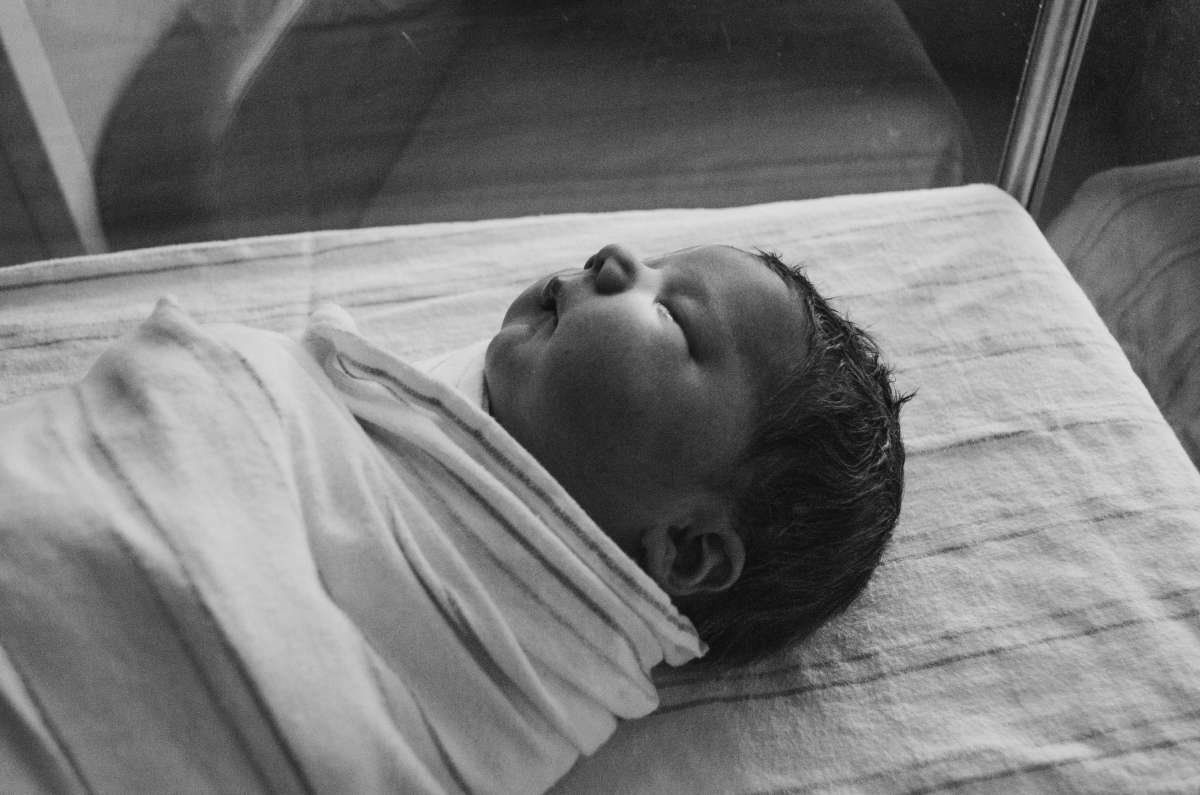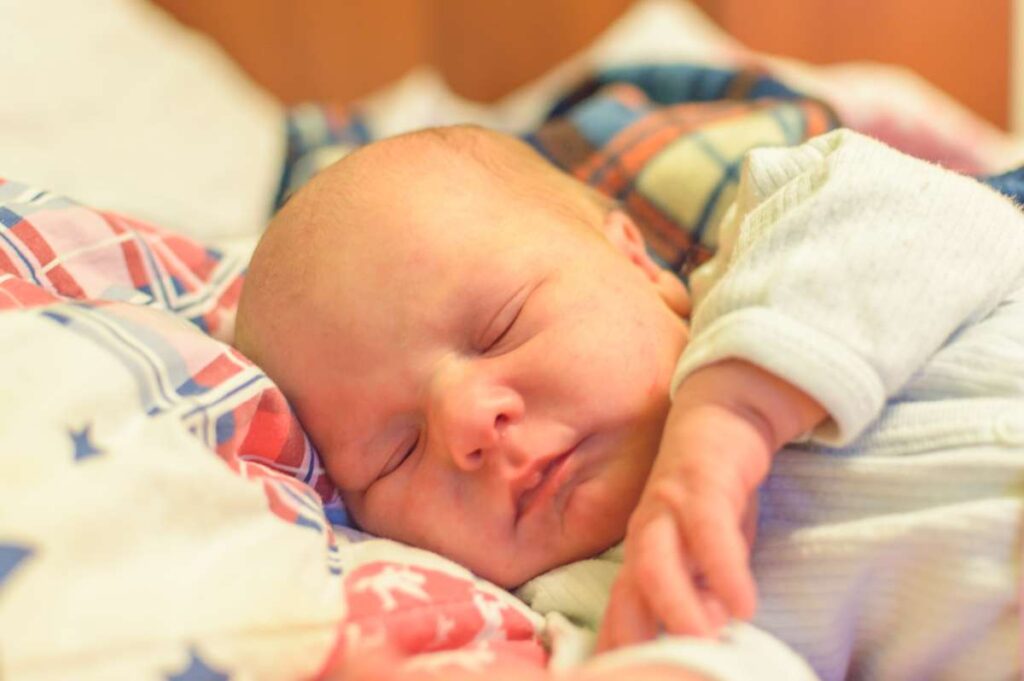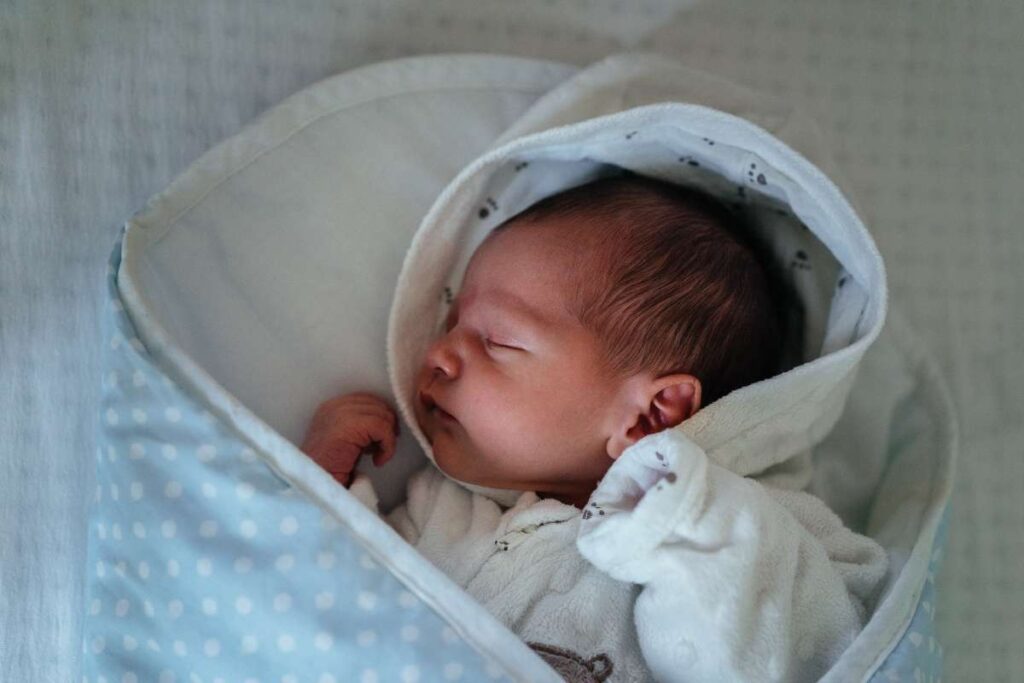When your newborn or young children don't sleep, parents don't sleep. As if that weren't enough, not getting enough sleep has been linked to a host of undesirable health consequences. Getting a good night's sleep is beneficial for everyone, but it's especially important for young children and infants.
There are a number of tried-and-true methods that can help you get your newborn or child into sleep at night if you're having trouble doing so. It may take a while to apply all of them, but everyone will profit in the long run if you succeed in helping your children develop healthier sleep routines.
Specialist sleep coaches are the best source of information for ensuring a restful night's sleep for infants and young children. So, We asked two professionals for their best recommendations on getting a good night's sleep; their suggestions are below.
- Instruct your infants and children to begin sleeping without you: To put it bluntly, occasionally you are that reason your infant can't fall or stay asleep. Babies and kiddos need to learn to sleep through the night on their own. Babies shouldn't be rocked to sleep or given a bottle before bed; instead, they should be left awake in their cribs. They should be capable of going to sleep less quickly and remain asleep for longer periods of time. Infants have cyclical sleep patterns, with brief awakenings after each stage of sleep. During the jolt to consciousness, they check about to make sure it's a suitable moment to sleep. This safety system is in place to make sure there is no threat. Helping your baby fall asleep (by rocking, breastfeeding, bouncing, etc.) will cause them to wake up completely if you put them down. Murray warns that you'll need to help them get back to sleep. Let them practice sleeping alone so that they can calmly fall back to sleep if they wake up throughout the night. Even if you're inclined to sleep with your child, Murray advises you shouldn't. If you're there when they go to sleep, you'll have to be there while they're trying to re-establish sleep patterns in the late hours of the night. They won't feel refreshed and will be irritable the following day if your sleep is disrupted.
- Try not to let too much time pass between a baby's nap and bedtime; this is especially crucial for newborns. If you do, their body will respond by producing cortisol, sometimes known as the "alert hormone," making it more difficult for children to get to sleep or stay asleep. Overstimulation and increased cortisol levels suggest limiting children's sugar intake, especially after lunch. Cortisol is produced in the body in response to ingested sugar in an effort to reduce blood glucose levels. A high concentration of cortisol, a stimulating hormone, will prevent restful sleep.
- A "cave" can be created for sleeping: The best night's sleep may be had by anyone—even babies—in a dark, warm, and quiet setting. Get them a bed that looks like it was dug out of the ground, like in a tiny cave. Everything should be quiet, cool, and dark. If you want to make sure it's dark enough for your infant to sleep, Murray recommends using blackout curtains. Fear of a dark typically begins at the age of two and a half, at which point it is preferable to introduce a nightlight. If your bedroom doesn't have a thermostat, a desktop thermometer can help you keep the temperature between 68 and 72 degrees Celsius, which is ideal for sleeping. Use a sound machine to drown out any outside or indoor noise that can wake your sleeping children. Brown noise, with a lower frequency, is more relaxing than white noise, so it's great if the machine can produce it.
- Maintain a regular bedtime and nap routine: As according to Arielle Greenleaf, Motherfigure sleep coach and chief school administrator at Restful & Rest Academy, children and infants benefit greatly from having a regular, predictable schedule for sleep and napping. " Also, keep in mind that kids of all ages require plenty of shut-eye to thrive. Keeping your infants and kids on a regular schedule will assist them avoid becoming overtired. Whenever it's time for bed, kids may try to convince you to keep playing, reading, or watching TV with them because they don't want the enjoyment to end. However, maintaining a regular bedtime will help guarantee that they get the rest they need. Be sure to set and stick to strict, clear, and consistent bedtime limits. When you turn out the lights, tell your kid to stay in bed and remain quiet till morning. Overtiredness occurs when a youngster is permitted to get out of bed and make several requests (such as an additional hug or drink). As a result, individuals have problems dropping off to sleep.
New parents report a decline in both the quality and quantity of their sleep after the birth of a child, and this decline persists until the child is between the ages of four and six. But that doesn't mean you can't take measures to enhance your situation, particularly your baby's capacity to get to sleep and remain asleep (so you can, too).
We've covered you whether you're reading this the month you're due to give birth or in the midst of a screaming fit at 3 a.m.
Baby Nursery FAQs
3-6 months: what to expect from baby sleep
Babies might start moving towards a pattern of 2-3 daytime sleeps of up to two hours each. And night-time sleep gets longer at this age. For example, some babies might be having long sleep of six hours at night by the time they're six months old.
The secret to speedy snoozing is to rub your hand gently over a baby's head and eyes, then repeat until they nod off, in just under a minute if this dad's example is anything to go by.
Most issues related to a baby not sleeping are caused by temporary things like illness, teething, developmental milestones or changes in routine — so the occasional sleep snafu likely isn't anything to worry about.
In short, dealing with nighttime disruptions is often simply a part of new parenthood. Most issues related to a baby not sleeping are caused by temporary things like illness, teething, developmental milestones or changes in routine — so the occasional sleep snafu likely isn't anything to worry about.
If your baby is taking a 30-minute nap or less, she is likely overtired and needs less time between naps. If your baby is waking up 45 minutes into a nap, she is likely not tired enough and needs more wake time.
How To Get Your Infant To Sleep Quickly

When your child finally goes to sleep, you'll finally be able to get some rest. However, it's simpler said than done to get your kid to sleep through the night.
If singing a lullaby or cuddling your child before bedtime doesn't help your youngster drift off to sleep, try one of these other tried-and-true methods instead.
Set An Early Bedtime
The best method to make sure your baby is drowsy when it's time to lay them down for the night is to implement an early bedtime, say the experts. Babies' melatonin levels, the hormone that tells your body it's time to sleep, begin to rise at around the eight-week mark.
Keep in mind that melatonin levels rise as the sun goes down, and that if your baby was kept awake for too long, they will become overwhelmed and difficult to get to sleep.
Their sleep-wake cycle is more stable if they go to bed at the same time each night, like 6:30 or 7. Babies with late bedtimes at 18 months are more likely to have difficulties with motor function, social skills, and language, according to studies.
Bedtimes that are inconsistent or too late can have a negative impact on a child's behaviour and concentration in the classroom as they grow older.
Create A Relaxing Environment
Your infant's room should be warm and inviting so that they feel safe and secure, and most of all, sleeping. Most young children love night lights, but it's important to think about where to put them and how bright they should be. The release of melatonin, a hormone that regulates sleep, can be disrupted or delayed by exposure to light.
Your child doesn't require the same level of luxury in their sleep environment as you do, but you should still make sure their mattress is enough for sleep if you wish them to go to sleep quickly. Little ones put very little weight on a bed, so they require something that both cradles and sustains their frail frames.
When They're Sleepy, Put Them Down (Not Asleep)
Putting your baby down for the night after they are already sleeping is too late. Since your infant dozed off on your shoulder inside the living room, when it awakes in the midst of the night it may be disoriented and fussy because it will not immediately recognise its location. The goal is to reduce their reliance on you putting them to sleep again.
Babies can learn to put themselves to sleep around the 5-6 month mark. On the other hand, it's the responsibility of the parent to ensure that their child reaches the stage of feeling safe enough to do so.
As a result, putting your child to sleep when you see that they are starting to feel sleepy will assist them go asleep without you. Calmness, blank gaze, closed fists, yawning, and jerky leg and arm motions are all signs of tiredness.
Don't Always Go To Their Crib.
It can be extremely difficult to resist the impulse to comfort a wailing baby in the late hours of the night, especially if you are a first-time parent. However, if you are confident that they are being attended to, you should wait a moment before intervening (fed, diaper changed, etc.).
The idea is to teach your youngster to relax without your help. Experts recommend trying the "soothing ladder" if that doesn't help.
Pat and rub them first; don't pick them up just yet. You must tread lightly at first lest you further disturb their sleep. Start by patting them gently, then progress to rocking them, and save feeding them for last if that doesn't work.
Until the baby learns to self-soothe, you should continue using the soothing ladder method, as this will help reduce the frequency with which your baby cries.
Create A Calming Nighttime Routine
Your baby will have a hard time falling asleep on time if you expose him or her to too much stimulation right before bed. You and your newborn should begin including nighttime routines that promote rest and relaxation around the 6- to 8-week mark.
Maintaining a schedule can assist cue your infant that it's time for bed. In time, their body will learn to associate the ritual with bedtime.
Take steps to quiet the house and turn off any bright lights about twenty minutes before bedtime to assist them relax before sleep. Then, try to integrate soothing activities like a hot bath or a quiet read-aloud that your child appreciates.
Reading to your child is beneficial in many ways, and studies show that you can begin doing so as early as the day you bring your newborn home from the hospital.
Swaddle
Up until about five or six months of age, newborns have a startle reaction that makes them feel like they are falling. Babies' sleep is disrupted by this feeling, causing them to wake up upset or wailing. If your infant has a habit of suddenly sitting up, swaddle him or her securely to prevent this. Your infant will feel more secure, which leads to greater sleep. By providing a snug and secure environment, swaddling can help your newborn feel as safe as if she were still in your womb. If your baby has trouble falling or staying asleep, swaddling her in a comfortable blanket may help.
The Influence Of Dream Feeding
You have to be familiar with the concept of dream feeding. The term "bedtime feeding" refers to the last meal of the day for a young child. You and your infant will both benefit from getting a full night's rest if you adhere to the recommended practice of feeding your baby just before turning in for the night. Babies are notorious for waking up in the wee hours of the morning demanding food. Feed your baby at bedtime to ensure a restful night's sleep and a happy, healthy morning for you both. In addition, if you use this feeding technique, your infant will be able to sleep well all night long.
Routine For Going To Bed
Babies have no concept of time and hence have no idea when to wake up or go to sleep. Your job as a parent is to help your child recognize their routine by always doing things in the same sequence. Create an orderly list of baby activities and put them on a chart so that your child always knows what to expect next. Most parents find success with this method because their infants' behaviour becomes more consistent.
Try Relaxing Music
Many mothers find that reading bedtime stories or singing lullabies to their infants helps them drift off to sleep peacefully. Putting a baby to sleep is easier than ever with the help of some soothing tunes. (There are other additional advantages to listening to music.) In order to stimulate your infant without making her anxious, you might play any kind of music that is pleasant and relaxing.
Maintain An Eat-Wake-Sleep Cycle.
Eat-Wake-Sleep is a common routine for infants. This pattern begins each morning and continues throughout the day. The baby can sleep soundly after eating. Therefore, if you want your infant to go to sleep more quickly on a consistent basis, you should try this.
Avoid Excessive Excitement
Infants are readily diverted from whatever they are doing. She might have been feeling sleepy just a second before, but now she seems completely awake. Babies discover the world in a state of constant wonder. As a result, they find joy in absolutely everything. A new toy can be anything from a bright colour to an article of clothing or even a dog. Keep your baby's routine consistent and low-key so they can learn to cope with stress.
Allow Them To Sleep After They Have Become Drowsy.
There will be times when you want to be with your infant till she is sound asleep. If you do this, your baby may start to rely on you to help him or her fall asleep. As a result, when your infant reaches the point when she appears sleepy, put her down in her crib and let her go to sleep on her own. Because you may not be present every time, she may develop healthier sleeping patterns.
Sleep Is Critical For Infants

Infants, in particular, depend on sleep for their physical and cognitive development, but this is true for everybody of any age.
Hyperactivity, negative or violent behaviour, mood swings, and/or anxiety might develop as a result of sleep deprivation during these formative years.
Rapid eye movement (REM) sleep and non-REM sleep are two separate subtypes of slumber. At around six months of age, however, infants spend only approximately 30% of their time in REM, compared to the 50% they spend in the other stages. Rapid eye movement (REM) sleep is important for infants' cognitive development because it helps them prepare their brains to remember new knowledge.
In contrast, muscle tissue is remodelled and a growth hormone that is important to their development is secreted during non-REM sleep.
If you're wondering not whether your infant is getting enough rest, the chart below can assist.
- Babies under eight hours (with naps)
- For a whole month, that comes out to 15.5 hrs (with naps)
- 15 hours: three months (with naps)
- Time in months: 14 minutes (with naps)
- The time span of nine months and fourteen hours (with naps)
- Time in a year and fourteen hours (with naps)
- A half-year and a half-hour and fifteen minutes (with naps)
- Age of the Earth in Years: 14 Hours (with naps)
Conclusion
Regular, restful sleep benefits young children and newborns. Leave babies and toddlers awake in their cribs before bedtime to get acclimated to sleeping alone. Limiting children's sugar intake, especially after lunch, may minimise cortisol and overstimulation. Cortisol stimulates, making it hard to fall asleep. A sound machine can help your kids sleep by blocking external and internal disturbances.
Routines assist infants and children in avoiding tiredness. After several pleas, letting a child out of bed can fatigue them. Early bedtimes are the best approach to getting your child to sleep. Late bedtimes might affect a child's behaviour and schoolwork. Late-bedtime babies are more likely to have motor, social, and language deficits by 18 months.
Start evening routines that promote rest and relaxation for you and your newborn at about 6–8 weeks. Bedtime routines teach babies to go to sleep. Swaddling your fussy baby in a warm blanket may help her fall asleep. Feed your infant a balanced meal before night to support healthy sleep and morning mood. Post a newborn activity schedule for your child to follow.
This method helps babies behave more steadily. Maintain a low-stress schedule to assist your child in coping with stress. Sleep aids infants' development. Sleep deprivation can cause hyperactivity, mood swings, aggression, and concern.
Content Summary
- When your newborn or young children don't sleep, parents don't sleep.
- Getting a good night's sleep benefits everyone, but it's especially important for young children and infants.
- Some tried-and-true methods can help you get your newborn or child to sleep at night if you're having trouble doing so.
- Specialist sleep coaches are the best source of information for ensuring a restful night's sleep for infants and young children.
- So, We asked two professionals for their best recommendations on getting a good night's sleep; their suggestions are below.
- Babies and kiddos need to learn to sleep through the night on their own.
- Overstimulation and increased cortisol levels suggest limiting children's sugar intake, especially after lunch.
- A high concentration of cortisol, a stimulating hormone, will prevent restful sleep.
- A "cave" can be created for sleeping: The best night's sleep may be had by anyone—even babies—in a dark, warm, and quiet setting.
- Get them a bed that looks like it was dug out of the ground, like in a tiny cave.
- Murray recommends using blackout curtains if you want to make sure it's dark enough for your infant to sleep.
- Use a sound machine to drown out any outside or indoor noise that can wake your sleeping children.
- " Also, keep in mind that kids of all ages require plenty of shut-eye to thrive.
- Keeping your infants and kids on a regular schedule will assist them in avoiding becoming overtired.
- However, maintaining a regular bedtime will help guarantee that they get the rest they need.
- Set and stick to strict, clear, and consistent bedtime limits.
- New parents report a decline in both the quality and quantity of their sleep after the birth of a child, and this decline persists until the child is between the ages of four and six.
- However, getting your kid to sleep through the night is simpler said than done.
- If singing a lullaby or cuddling your child before bedtime doesn't help your youngster drift off to sleep, try one of these other tried-and-true methods instead.
- The best method to ensure your baby is tired when it's time to lay them down for the night is to implement an early bedtime, say the experts.
- Their sleep-wake cycle is more stable if they go to bed at the same time each night, like 6:30 or 7.
- Your infant's room should be warm and inviting so they feel safe and secure and, most of all, sleeping.
- Putting your baby down for the night after sleeping is too late.
- The goal is to reduce their reliance on you, putting them to sleep again.
- Babies can learn to put themselves to sleep around the 5-6 month mark.
- However, if you are confident they are being attended to, you should wait a moment before intervening (feeding, diaper change, etc.).
- Until the baby learns to self-soothe, you should continue using the soothing ladder method, as this will help reduce the frequency with which your baby cries.
- You and your newborn should begin including nighttime routines that promote rest and relaxation around the 6- to 8-week mark.
- Maintaining a schedule can assist in cuing your infant that it's time for bed.
- You have to be familiar with the concept of dream feeding.
- The term "bedtime feeding" refers to a young child's last meal of the day.
- You and your infant will benefit from a full night's rest if you adhere to the recommended practice of feeding your baby just before turning it in for the night.
- Feed your baby at bedtime to ensure restful sleep and a happy, healthy morning.
- There are other additional advantages to listening to music.)
- Eat-Wake-Sleep is a common routine for infants.
- Therefore, if you want your infant to sleep more quickly and consistently, you should try this.
- Keep your baby's routine consistent and low-key so they can learn to cope with stress.
- There will be times when you want to be with your infant till she is sound asleep.
- As a result, when your infant reaches the point when she appears sleepy, put her down in her crib and let her go to sleep on her own.
- Rapid eye movement (REM) sleep and non-REM sleep are two subtypes of slumber.
- Rapid eye movement (REM) sleep is important for infants' cognitive development because it helps them prepare their brains to remember new knowledge.
- The chart below can assist if you're wondering whether your infant is getting enough rest.






